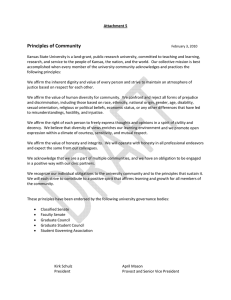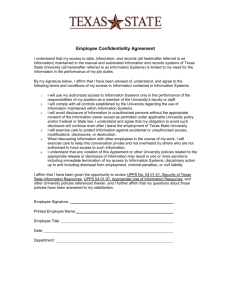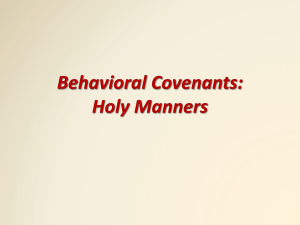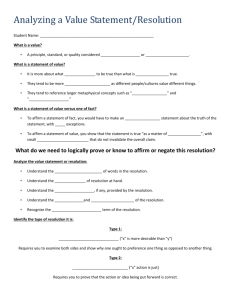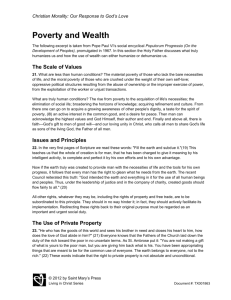Justice Policy - Kentucky Council of Churches
advertisement
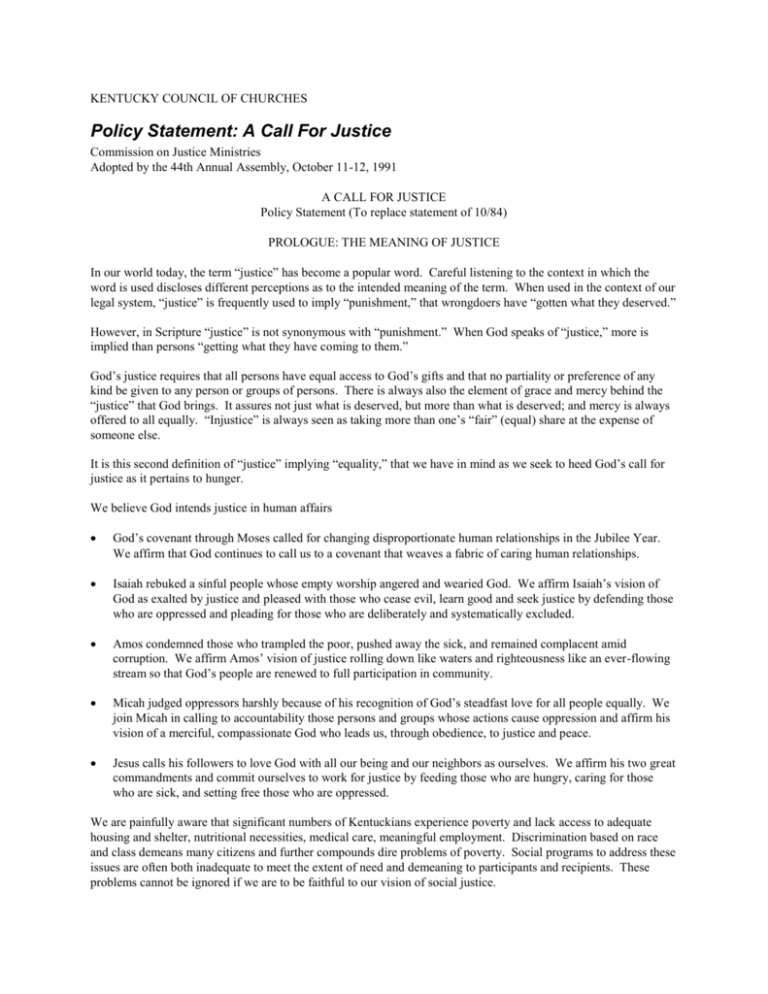
KENTUCKY COUNCIL OF CHURCHES Policy Statement: A Call For Justice Commission on Justice Ministries Adopted by the 44th Annual Assembly, October 11-12, 1991 A CALL FOR JUSTICE Policy Statement (To replace statement of 10/84) PROLOGUE: THE MEANING OF JUSTICE In our world today, the term “justice” has become a popular word. Careful listening to the context in which the word is used discloses different perceptions as to the intended meaning of the term. When used in the context of our legal system, “justice” is frequently used to imply “punishment,” that wrongdoers have “gotten what they deserved.” However, in Scripture “justice” is not synonymous with “punishment.” When God speaks of “justice,” more is implied than persons “getting what they have coming to them.” God’s justice requires that all persons have equal access to God’s gifts and that no partiality or preference of any kind be given to any person or groups of persons. There is always also the element of grace and mercy behind the “justice” that God brings. It assures not just what is deserved, but more than what is deserved; and mercy is always offered to all equally. “Injustice” is always seen as taking more than one’s “fair” (equal) share at the expense of someone else. It is this second definition of “justice” implying “equality,” that we have in mind as we seek to heed God’s call for justice as it pertains to hunger. We believe God intends justice in human affairs God’s covenant through Moses called for changing disproportionate human relationships in the Jubilee Year. We affirm that God continues to call us to a covenant that weaves a fabric of caring human relationships. Isaiah rebuked a sinful people whose empty worship angered and wearied God. We affirm Isaiah’s vision of God as exalted by justice and pleased with those who cease evil, learn good and seek justice by defending those who are oppressed and pleading for those who are deliberately and systematically excluded. Amos condemned those who trampled the poor, pushed away the sick, and remained complacent amid corruption. We affirm Amos’ vision of justice rolling down like waters and righteousness like an ever-flowing stream so that God’s people are renewed to full participation in community. Micah judged oppressors harshly because of his recognition of God’s steadfast love for all people equally. We join Micah in calling to accountability those persons and groups whose actions cause oppression and affirm his vision of a merciful, compassionate God who leads us, through obedience, to justice and peace. Jesus calls his followers to love God with all our being and our neighbors as ourselves. We affirm his two great commandments and commit ourselves to work for justice by feeding those who are hungry, caring for those who are sick, and setting free those who are oppressed. We are painfully aware that significant numbers of Kentuckians experience poverty and lack access to adequate housing and shelter, nutritional necessities, medical care, meaningful employment. Discrimination based on race and class demeans many citizens and further compounds dire problems of poverty. Social programs to address these issues are often both inadequate to meet the extent of need and demeaning to participants and recipients. These problems cannot be ignored if we are to be faithful to our vision of social justice. We believe that God’s intent for justice in creation will not finally be resisted. We covenant to be faithful and obedient to this vision of a world where justice reigns and to work intentionally and immediately toward achieving it. We pray for the strength and freedom to imagine and carry out bold and creative acts of justice in our world. WE THEREFORE resolve to work together as a community of faith and to cooperate with others at the local, state, and national levels to promote both short and long term solutions to problems of poverty and discrimination and other forms of injustice. At the same time, we urge local congregations and church agencies to continue to expand their ministry to the physical, emotional, and spiritual needs of all people, and to give special attention to working with the poor. Social policies and programs addressed to these issues should: 1) recognize the mutual responsibility of all people both as individuals and as groups for each other; 2) promote participation in the opportunities and responsibilities of citizens in our society without respect to race or class; 3) provide support and resources adequate for basic life necessities 4) promote opportunities to escape the limited choices of the impoverished; and 5) encourage all citizens to examine how existing social structures maintain poverty and discrimination.
